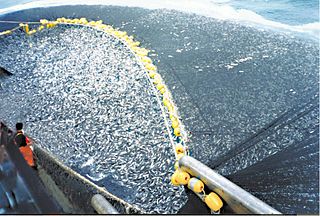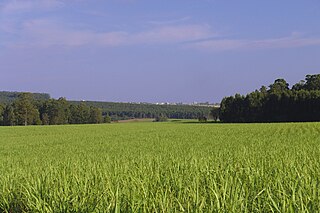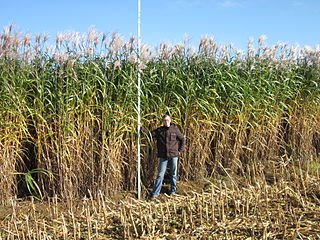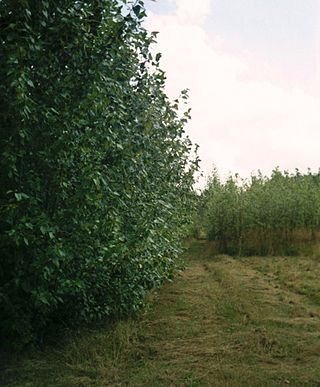
Biofuel is a fuel that is produced over a short time span from biomass, rather than by the very slow natural processes involved in the formation of fossil fuels, such as oil. Biofuel can be produced from plants or from agricultural, domestic or industrial biowaste. The climate change mitigation potential of biofuel varies considerably, from emission levels comparable to fossil fuels in some scenarios to negative emissions in others. Biofuels are mostly used for transportation, but can also be used for heating and electricity. Biofuels are regarded as a renewable energy source.

A renewable resource, also known as a flow resource, is a natural resource which will replenish to replace the portion depleted by usage and consumption, either through natural reproduction or other recurring processes in a finite amount of time in a human time scale. When the recovery rate of resources is unlikely to ever exceed a human time scale, these are called perpetual resources. Renewable resources are a part of Earth's natural environment and the largest components of its ecosphere. A positive life-cycle assessment is a key indicator of a resource's sustainability.

Bioenergy is energy made from biomass, which consists of recently living organisms, mainly plants. Types of biomass commonly used for bioenergy include wood, food crops such as corn, energy crops and waste from forests, yards, or farms. The IPCC defines bioenergy as a renewable form of energy. Bioenergy can either mitigate or increase greenhouse gas emissions. There is also agreement that local environmental impacts can be problematic.

Pellet fuels are a type of solid fuel made from compressed organic material. Pellets can be made from any one of five general categories of biomass: industrial waste and co-products, food waste, agricultural residues, energy crops, and untreated lumber. Wood pellets are the most common type of pellet fuel and are generally made from compacted sawdust and related industrial wastes from the milling of lumber, manufacture of wood products and furniture, and construction. Other industrial waste sources include empty fruit bunches, palm kernel shells, coconut shells, and tree tops and branches discarded during logging operations. So-called "black pellets" are made of biomass, refined to resemble hard coal and were developed to be used in existing coal-fired power plants. Pellets are categorized by their heating value, moisture and ash content, and dimensions. They can be used as fuels for power generation, commercial or residential heating, and cooking.
Energy forestry is a form of forestry in which a fast-growing species of tree or woody shrub is grown specifically to provide biomass or biofuel for heating or power generation.

Energy crops are low-cost and low-maintenance crops grown solely for renewable bioenergy production. The crops are processed into solid, liquid or gaseous fuels, such as pellets, bioethanol or biogas. The fuels are burned to generate electrical power or heat.

Drax Group PLC is a power generation business. The principal downstream enterprises are based in the UK and include Drax Power Limited, which runs the biomass and coal fuelled Drax power station, near Selby in North Yorkshire. The Group also runs an international biomass supply chain business. The company is listed on the London Stock Exchange and is a constituent of the FTSE 250 Index.

Biomass (for energy) is matter from recently living (but now dead) organisms which is used for bioenergy production. Examples include wood, wood residues, energy crops, agricultural residues, and organic waste from industry and households. Wood and wood residues is the largest biomass energy source today. Wood can be used as a fuel directly or processed into pellet fuel or other forms of fuels. Other plants can also be used as fuel, for instance corn, switchgrass, miscanthus and bamboo. The main waste feedstocks are wood waste, agricultural waste, municipal solid waste, and manufacturing waste. Upgrading raw biomass to higher grade fuels can be achieved by different methods, broadly classified as thermal, chemical, or biochemical.

Miscanthus × giganteus, also known as the giant miscanthus, is a sterile hybrid of Miscanthus sinensis and Miscanthus sacchariflorus. It is a perennial grass with bamboo-like stems that can grow to heights of 3–4 metres (13 ft) in one season. Just like Pennisetum purpureum, Arundo donax and Saccharum ravennae, it is also called elephant grass.

Short rotation coppice (SRC) is coppice grown as an energy crop. This woody solid biomass can be used in applications such as district heating, electric power generating stations, alone or in combination with other fuels. Currently, the leading countries in area planted for energy generation are Sweden and the UK.
Biofuel is fuel that is produced from organic matter (biomass), including plant materials and animal waste. It is considered a renewable source of energy that can assist in reducing carbon emissions. The two main types of biofuel currently being produced in Australia are biodiesel and bioethanol, used as replacements for diesel and petrol (gasoline) respectively. As of 2017 Australia is a relatively small producer of biofuels, accounting for 0.2% of world bioethanol production and 0.1% of world biodiesel production.
On April 25, 2006, Executive Order S-06-06, the Bioenergy Action Plan was issued by the then governor of California, Arnold Schwarzenegger, outlining a set of target goals which would establish the increasing use and production of biofuels and biopower for both electricity generation and substitution of natural gas and petroleum within the state of California. The plan asked multiple state agencies to work towards the advancement of biomass programs in California. The order would also help provide statewide environmental protection, mitigation and economic advancement. The plan was passed on July 7, 2006, with progress reports issued in 2007 and 2009.
Second-generation biofuels, also known as advanced biofuels, are fuels that can be manufactured from various types of non-food biomass. Biomass in this context means plant materials and animal waste used especially as a source of fuel.

The Food, Conservation, and Energy Act of 2008 was a $288 billion, five-year agricultural policy bill that was passed into law by the United States Congress on June 18, 2008. The bill was a continuation of the 2002 Farm Bill. It continues the United States' long history of agricultural subsidies as well as pursuing areas such as energy, conservation, nutrition, and rural development. Some specific initiatives in the bill include increases in Food Stamp benefits, increased support for the production of cellulosic ethanol, and money for the research of pests, diseases and other agricultural problems.
China has set the goal of attaining one percent of its renewable energy generation through bioenergy in 2020.
There are various social, economic, environmental and technical issues with biofuel production and use, which have been discussed in the popular media and scientific journals. These include: the effect of moderating oil prices, the "food vs fuel" debate, poverty reduction potential, carbon emissions levels, sustainable biofuel production, deforestation and soil erosion, loss of biodiversity, effect on water resources, the possible modifications necessary to run the engine on biofuel, as well as energy balance and efficiency. The International Resource Panel, which provides independent scientific assessments and expert advice on a variety of resource-related themes, assessed the issues relating to biofuel use in its first report Towards sustainable production and use of resources: Assessing Biofuels. In it, it outlined the wider and interrelated factors that need to be considered when deciding on the relative merits of pursuing one biofuel over another. It concluded that not all biofuels perform equally in terms of their effect on climate, energy security and ecosystems, and suggested that environmental and social effects need to be assessed throughout the entire life-cycle.
Bioenergy with carbon capture and storage (BECCS) is the process of extracting bioenergy from biomass and capturing and storing the carbon, thereby removing it from the atmosphere. BECCS can be a "negative emissions technology" (NET). The carbon in the biomass comes from the greenhouse gas carbon dioxide (CO2) which is extracted from the atmosphere by the biomass when it grows. Energy ("bioenergy") is extracted in useful forms (electricity, heat, biofuels, etc.) as the biomass is utilized through combustion, fermentation, pyrolysis or other conversion methods.

The Association for Renewable Energy and Clean Technology, previously known as Renewable Energy Association (REA), is a renewable energy and clean technology trade association in the UK encompassing all of renewables industry in the United Kingdom. REA covers renewable power & flexibility, heat and cooling, circular bioresources and transport. The REA is a not-for-profit company.

NNFCC is a consultancy company specialising in bioenergy, biofuels and bio-based products.
The economic biomass potential of Turkey is 32 million tons of oil equivalent (Mtoe)/year. Total biomass production is estimated to reach 52.5 Mtoe by 2030. Arable crops in Central Anatolia and the Mediterranean have the most potential for electricity, and in 2021 biomass generated 7.6 TWh, which was 2.3% of the nation's electricity, from over 2 GW capacity. An estimated 6.5 million homes in Turkey use biomass as their main source of heating fuel.












